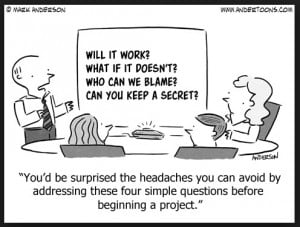
I found this cartoon had a clever and funny way to depict the stages of a project. In thinking back to our class activities and assignments, including this past week (Project Network with Post-Its, Identifying Critical Path with Rock ‘N Bands), it is proven that there is more than one way to think about the same project. Can we take the questions from the cartoon and relate them to the class so far?
Will it work? For the sake of discussion, let’s assume “it” is a project itself. Asking a question about whether a project will work or not begins with knowing what the project is and defining how you know it worked. This sounds similar to the Request for Idea and Implementation Plan assignments. In class, we learned it is important to know what the measures of success are in order to understand if the plan was completed accordingly, and to consider project scope at all times.
What if it doesn’t? When the project does not go as planned, is there something to do? After the Implementation Plan is set, the next step we learned is to consider what happens when something does not go as planned. The question begins with “What if,” which is a perfect way to think about risks in a project. There can be a long list of “What if” statements, but identifying these risks was part of the assignment of the Risk Analysis. It was also important to discuss the contingency plans for when “it doesn’t” work.
Who can we blame? This particular question seems harsh at first, but consider more of the class assignments and the reason for them. We have heard a few times that “if ‘team’ is assigned to a task, then no one will do it.” The Work Breakdown Structure was completed for the purpose of knowing which team member would work on a task, and subsequently, who to follow-up with. It would be inappropriate per the cartoon to blame one team member or other source for the entire success of a project, but it should not be taken lightly either the impact one member can have on the rest of the group.
Can you keep a secret? Following the preceding question, the cartoon wants to suggest to keep any failures of the project a secret. This question may have been better phrased as “do you want to keep a secret?” The intent of the projects in class is to learn about project management through our successes and provide insight on what we can improve upon. It is important to provide a focused summary of how the project was completed, so by omission there may be some “secrets” on the blog. Overall, it is best to share with the class about what worked and what did not.
What do these questions mean to you? Did you find a different way to relate them to our class assignments or activities?
https://www.andertoons.com/management/cartoon/6953/headaches-avoid-addressing-4-questions-before-project